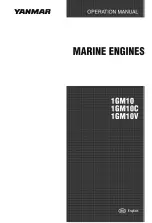
10 seconds. If this attempt also fails, the program relay will
connect the alarm circuit. On engines equipped with pneumatic
starting motors the period between the starting attempts should
be long enough to guarantee that the flywheel has stopped.
4 When the engine has reached a predetermined speed,
an auxiliary relay energized by the remote tacho transmitter
cuts off the starting circuit, and the starting air solenoid valve
closes.
At the same time the current to the priming pump will be
disconnected thus preventing the pump from operating when
the engine is running.
On certain installations the priming pump will continue to
operate at low engine speed to assist the engine driven lubri-
cating oil pump to maintain the oil pressure. After a fixed time
(10 - 30 s.) the system for alarm, stop and speed remote control
will be automatically connected.
03.2
Stop
03.2.1 Manual stop
1 Engines with built-on circulating water pump:
Idle the
engine 3 - 5 minutes before stopping. Engines with separate
circulating water pump: 2 - 3 minutes will be enough, but
the water pump should run for some 5 minutes more.
2 Stop the engine
by moving the stop lever into stop posi-
tion. The time of slowing down offers a good opportunity to
detect possible disturbing sounds.
03.2.2 Remote stop
1 Point 1 above is valid.
2 Press the remote control stop button.
The shut-down so-
lenoid, built on the governor, will then be energized for a fixed
time and at the same time, parallel to governor, the pneumatic
stop coil is also activated. The control racks of the injection
pumps move into stop position. The time for the solenoid to be
energized is set so (20 - 50 s.) that the solenoid operates until
the engine stops. During this time the engine cannot be restart-
ed. After a predetermined time the shut-down solenoid will
return to its initial position.
3 When the engine stops
and the speed decreases below a
certain limit, the system for alarm, stop and speed remote
control will be disconnected and the signal lamp indicating
that the engine is running goes out.
In engines equipped with automatic lubricating oil priming
pumps, the pump will be started at the same time.
22-9632
Start, Stop and Operation
03
VASA 22
03 - 3
Summary of Contents for Vasa R22
Page 14: ...Appendix B Welding Precautions 200147 00 4...
Page 42: ...02 Fuel Lubricating Oil Cooling Water 22 9601 02 22 VASA 22...
Page 60: ...03 Start Stop and Operation 22 9632 03 12 VASA 22...
Page 72: ...04 Maintenance Schedule 22 9845 III 04 12 MD HF...
Page 92: ...06 II Adjustments Clearances and Wear limits 22 9601 06 6 VASA 22...
Page 116: ...08 Operating Troubles Emergency Operation 22 9601 08 8 VASA 22...
Page 144: ...11 Crank Mechanism 22 9601 11 18 VASA 22...
Page 156: ...12 Cylinder Head with Valves 22 9601 12 12 VASA 22...
Page 164: ...13 Camshaft Driving Gear 22 9601 13 8 VASA 22...
Page 172: ...14 Valve Mechanism and Camshaft 22 9601 14 8 VASA 22...
Page 183: ...22 200520 Turbocharging and Air Cooling 15 VTR Turbocharger 15 11...
Page 189: ...15 III Turbocharging and Air Cooling 22 8604 15 6 VTR 161 251 Turbochargers...
Page 209: ...17 Fuel system 22 9601 17 8 VASA 22...
Page 229: ...18 Lubricating Oil System 22 9601 18 20 VASA 22...
Page 247: ...19 Cooling Water System 22 9601 19 18 VASA 22...
Page 261: ...21 Starting Air System 22 9601 21 10 VASA 22...
















































